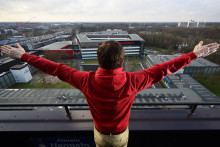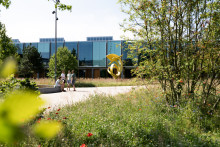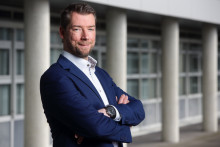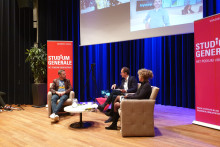Decrease of engagement
‘In our bachelor programme we have at most one international student per year, usually from Germany’, says Cas Keizers, chairman of C.T.S.G. Alembic, the study association for chemical engineering. ‘In our association the official language is Dutch, but we also organize activities for English speaking students from the master programme.’
According to Cas and Constantijn Rip, commissioner of educational affairs, it is not desirable to switch the language of education to English. Cas: ‘Our students can already develop their English proficiency in the bachelor and master programme. Switching to English will not make the programme more international. Instead, you would shut the door on many good students with dyslexia or who just lack linguistic skills.’
The board members of Alembic fear that changing the official language might decrease the engagement of their members. ‘But I hope we can decide on that for ourselves,’ Cas concludes.
Critical towards switching
Study association Paradoks, for technical medicine and biomedical technology, only organizes activities in Dutch. Lars Rikken, secretary, explains: ‘Only the master programme in biomedical technology is in English. Yearly we have about ten bachelor students from abroad and most of them soon speak Dutch quite fluently.’
According to Lars, a majority of members is critical towards switching to English. ‘There is no need for changing the education language,’ he says. ‘Most of our Technical Medicine students get a job in a Dutch hospital. And some courses in the bachelor programme of biomedical technology are already taught in English.’
Lars expects that Paradoks will only switch to English if the number of international members increases. ‘I think the official language will remain Dutch in the next coming years. We will only switch if language becomes a significant obstacle for our members.’
No barrier
Beerend Gerats is chairman of S.A. Proto, the association for creative technology students. He points out: ‘All our activities and communication are in English, since that is the official language of our bachelor programme. Approximately 30 percent of our active members comes from abroad. We do not want language to be a barrier. We even organized a cantus in English! Indeed, it is more difficult to express yourself in a language that is not your mother tongue. But at least that makes us equal.’
For Proto, there is not much new in the internationalization vision. ‘Switching the education language can only be successful if you include the language spoken at study associations,’ says Jim Tolman, commissioner of external affairs. ‘But the only way to realize that is a bottom-up approach.’
The Internationalization Vision 2015-2020 is one of the documents that will be discussed at the discussion meeting of the university council and the board on Wednesday March 25th. The meeting will be held in HT 1300 from 9:00 - 12:30 and is open for public.







